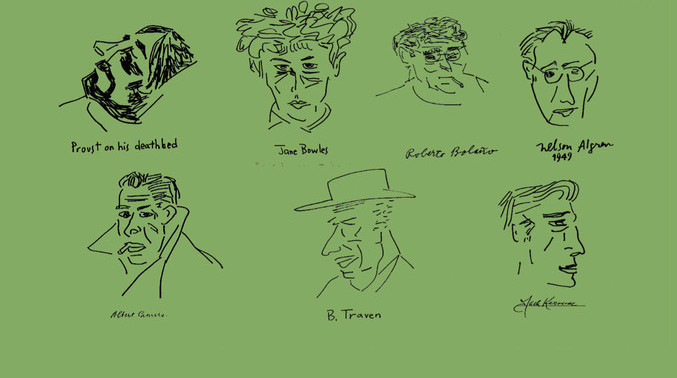Author, poet, screenwriter, and publisher Barry Gifford was awarded the Anne Friedberg Award for Contributions to Noir and Its Preservation at NoirCon 2016. Howard Rodman, the late Anne Friedberg’s husband, presented the award. These are his remarks.
¤
In Godard’s film Masculine/Feminine, 50 years old this month, an intertitle breaks the narrative of the film to announce:
HUMAN LABOR
RESSURECTS THINGS
FROM THE DEAD
Nowhere is this more true than in our own corner of the universe. When I first began my descent into noir — a descent that in many ways saved my life — the canon was not easy to find. My local public library’s circulating collection did not include Kill the Boss Goodbye. There were no search engines, save hands and feet and subway tokens. If you wanted to find a book by David Goodis, you came upon it, as the Surrealists would say, by chance or appointment. I was aided in my own education by Otto Penzler, who would kindly send me a postcard — from midtown New York to downtown New York — when a Thompson or a Highsmith would come in. And I roamed the aisles, although aisles in this case is generous, of Isaac Mendoza’s Bookstore on Ann Street behind Park Row, where for more than a century the merchant seamen would come to trade their books for cash (and then their cash for booze). I’d wait until friends were moving, needed to disburden themselves of their possessions, then pounce. Long-out-of-print tattered paperbacks, from Fawcett Gold Medal, from Lion, from God knows where. The classics, if you could find them. There was no other way to read these American books if you didn’t speak French.
Then came Gifford.
An accomplished novelist and poet, Gifford didn’t need to do any of this. His novels — I suspect most of you know Port Tropique, and near-all of you know the magnificent Sailor and Lula series, which has lasted long enough that it now chronicles the next generation. The novels are odd, wonderful, haunting, necessary. We follow his drifters until we ourselves are cast, in the best possible ways, adrift. Lost Highway, Wild at Heart — Gifford’s collaborations with David Lynch — brought out the strangest and most heartfelt in both of those men, and that is saying a lot. His poems are succinct and still and find their mark. Right now I’m reading his collection New York 1960, whose poems include In a Used Bookstore, and The Definition of Noir.
But for all that — and for most of us, all of that would have been sufficient — Gifford devoted countless hours, days, years to another calling. Because Gifford decided that access to the classics should not be restricted to the drifting habitués of dark precincts, but should instead be available to all. Working with Don Ellis of Creative Arts Books, Gifford founded Black Lizard: he used his human labor to resurrect our literature from the dead. Jim Thompson, David Goodis, Charles Willeford, Harry Whittington, Peter Rabe, Fredric Brown, Lionel White. I Wake Up Screaming. You Play the Red and the Black Comes Up. All these authors, all these texts, previously unfindable, introuvable, passed from hand-to-hand, read in translation, known only by rumor and innuendo, now in print. And in stores. And in their original language. Eighty different titles. Eighty of them.
With that one stroke, Gifford did two invaluable things: he codified our canon; and he made it available, for the first time, to the larger audience.
Lautréamont once said, poetry must be made by all and not by one. The corollary: poetry must be read by all and not by one. And that, I say to you tonight, is what Barry Gifford made possible. I count myself among the honored band of those who can say that their own writing owes everything to the writing that Barry Gifford gave us — of others, and of his own. He is a used bookstore of the soul; he is the definition of noir.
It is my honor and very real pleasure to present the Anne Friedberg Award for noir preservation to Barry Gifford.


